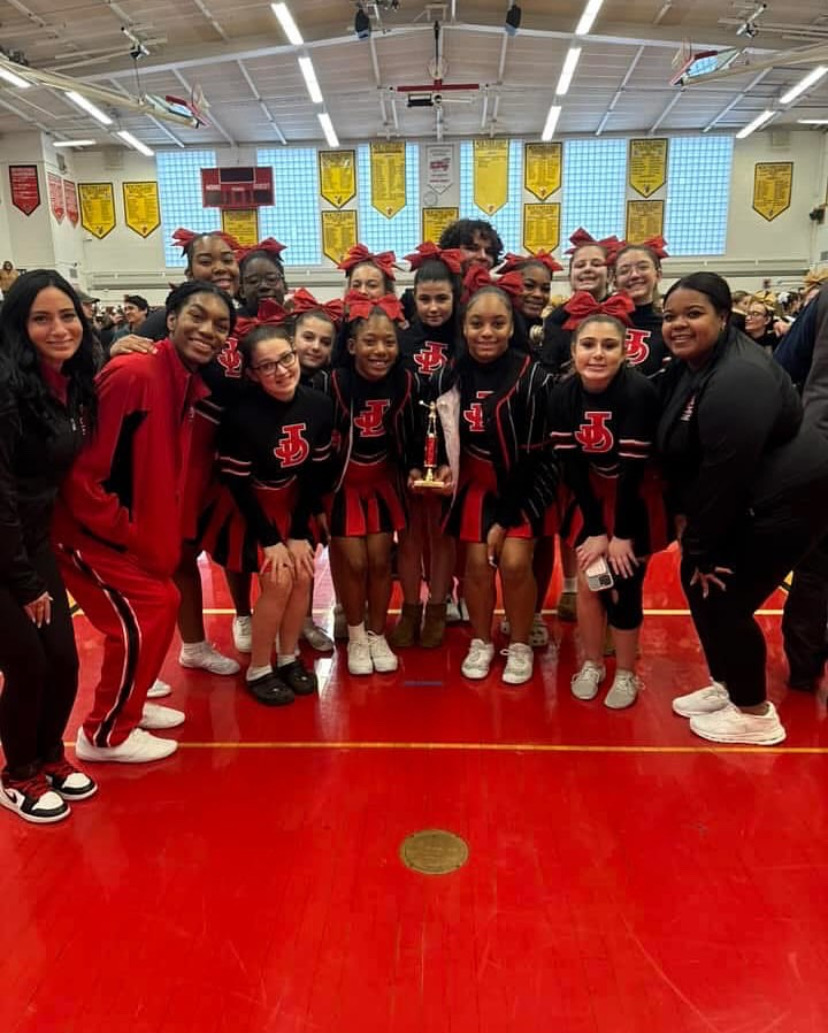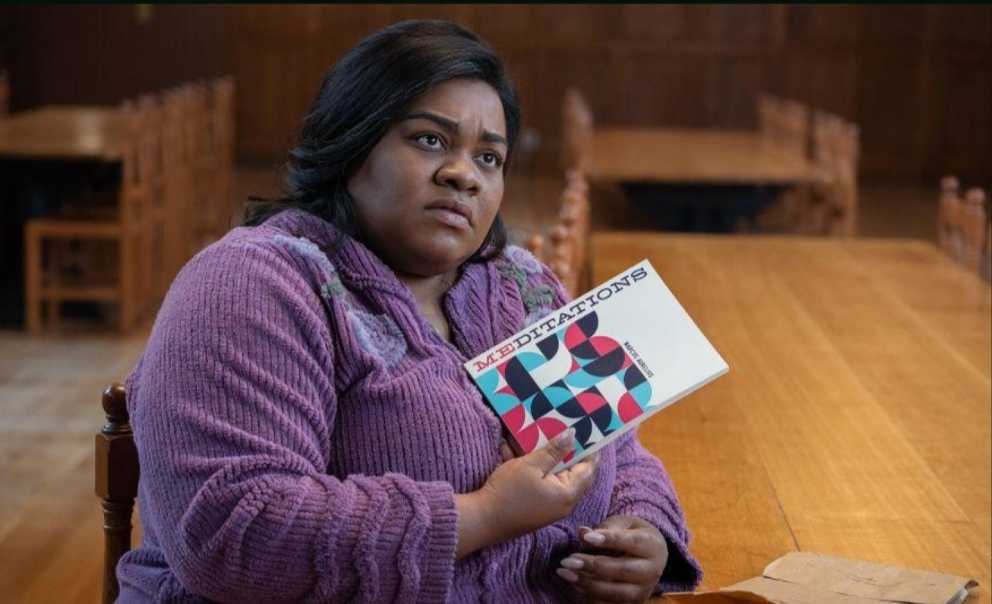The Parasitic Illness that Infects a Class System
Luke Hobika ’20
A capitalistic society is a society that inherently consists of both economic and social divisions. The factors that differentiate the classes in this society are their living conditions and their level of social respect. The idea of class distinction is greatly depicted in Bong Joon-ho’s 2019 social-satire film Parasite. Taking place in South Korea, a paragon of a capitalist society, Parasite follows the destitute Kim family attempting to boost their position in the class system by associating themselves with the wealthy Park family. As the Kims infiltrate into the lives of the Parks, they leach off the family’s wealth by becoming their servants. However, acting to preserve their social authority in society, the Parks find ways to enforce their social authority to prevent the Kims from accomplishing their desires. The factors of class differentiation between the two families support prominent German sociologist Max Weber’s theories of economic status and social honor in his 1921 book Economy and Society. Other intellectuals and their ideas like American cultural and literary historian Paul Fussell’s prescription of class characteristics in his 1983 text Class: A Guide Through the American Status System; American sociologist and former President of the American Sociological Association Arnold M. Rose’s exploration of social mobility in his 1964 European Journal of Sociology article “Social Mobility and Social Values”; and American analytical Marxist sociologist and educator Erik Olin Wright’s description of exploitative class relationships in his 1997 textbook Class Counts draw from the basic theories of Weber, making them ever so applicable to explaining the class separation depicted in Parasite. Using the key concepts of such prominent sociologists, Bong Joon-ho effectively spotlights the evident divisions between the upper and lower classes in a capitalistic society based on their economic and social situations through intense symbolism and flashpoints in the film Parasite.
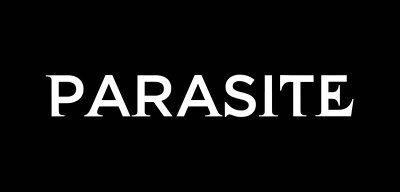
In the chapter “Class, Status, and Party” of Economy and Society, Max Weber defines class situation as being one’s “chance for a supply of goods, external living conditions, and personal life experiences” (Weber 57). According to Weber, the greater material wealth, level of social influence, and personal attributes one has, the more likely that person belongs to a higher class. Going beyond Weber’s definition of class situation, Paul Fussell identifies the unique characteristics of each class in a capitalistic society in Class: A Guide Through the American Status System. On the one hand, those of the upper class “are hidden away on their islands or behind the peek-a-boo walls of their distant estates” (Fussell 30). Existing behind the walls of their own confinement, their lives are “comfortable and ample and even entertaining, so long as [they] don’t mind never hearing anyone saying anything intelligent or original ” (Fussell 33). Essentially, the Fussell defines the upper class as indulging in a luxurious lifestyle while fostering their own ignorance by blocking themselves from the rest of society. However, even though the upper class lives in a secluded environment, they require constant assurance in themselves that they will not lose their prestigious position in society (Fussell 32). Bong Joon-ho highlights this depiction of the upper class through the symbol of the geographical location of the affluent estate of the Park family. The property sits comfortably on the apex of a hill, a durable wall covering it from the eyes of the public. Behind the wall, a heavenly atmosphere, defined by its spacious decor and modernized technology, blesses the estate. However, the life that this affluent family has made for themselves becomes artificial once it is considered in juxtaposition with what exists beyond its closed border.
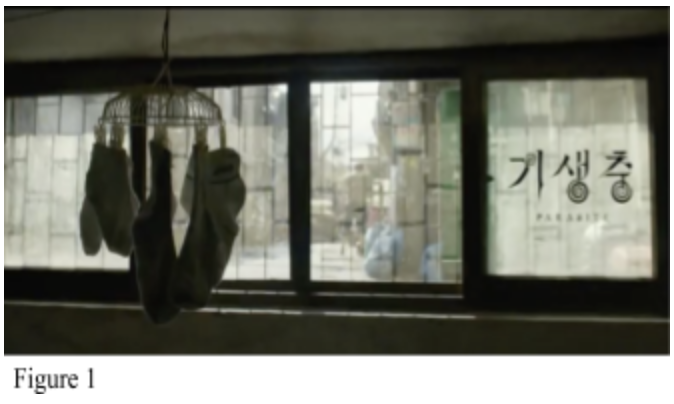
Inferior to the upper class is the lower class, which, in Fussell’s words, consists of those having ”gross uncertainty of his employment…social isolation is the norm here…” (Fussell 49). The lower class is constantly preoccupied with being able to take care of themselves tomorrow all while deteriorating in their unfortunate circumstances. The Kim family represents the lower class in Parasite. Similar to how the Parks experience a privileged lifestyle to demonstrate their belonging to the upper class, the Kims live in a cramped semi-basement apartment to showcase their destitution. Outside of the window of their housing complex exists a polluted street being frequently fumigated, homeless people peeing, and an unignorable stench (see Figure 1). Eventually, those of the lower class recognize the inaction of those who have the authority to reform their interclass issues, leading them to “a recognition of the value of freedom” over “a proclamation of the value of sheer cash” (Fussell 48). In other words, the members of the lower class prioritize achieving a purpose in their work over determining the significance of their income level to receive social recognition. In the case of the Kims, the family decides to abandon their traditional, low-paying temporary jobs of folding pizza boxes and instead seek to acquire the traits of the upper class by inserting themselves into the lives of the Parks. Eventually, they hope to climb the class ladder.
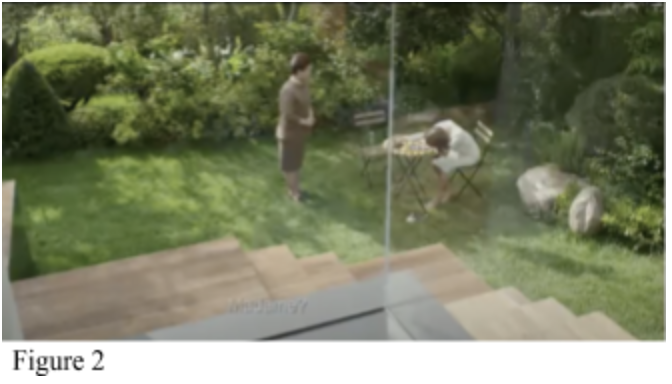
Like how Fussell explores Weber’s definition of class situation, Arnold M. Rose outlines the idea of social mobility based on Weber’s principles of class in “Social Mobility and Social Values”. According to Rose, social mobility describes the process of gaining or losing some socially-valued characteristics so that one’s rank in society changes (Rose 325). One driving force of social mobility is the amount of prestige one holds, and that prestige comes from the title of their occupation (Rose 326). According to Rose, social mobility based on occupation is dependent on two broad working categories: manual and non-manual workers. Those who occupy non-manual positions structurally possess authority over the manual workers. Yet, ironically, the accomplishments that the non-manual workers boast connect back to the efforts of the manual workers. The relationship between Yeon-kye, the mother of the Parks family, and her servants perfectly showcases this. While Yeon-kye forever lives in a state of relaxation, her servants are, in the background, unceasingly working to keep her personal demands in check. For instance, while Yeon-kye peacefully rests in her elaborate garden (see Figure 2), the housemaid is rushing around the kitchen and restocking snacks; the tutors are educating the kids; and the chauffeur is taxiing Dong-Ik, the father of the Parks family (14:05). Nevertheless, the lower-class manual workers’ efforts essentially maintain the prestigious lifestyle of the Parks rather than the lifestyle of their own. As a result, these members of the lower class do not experience any benefits that would contribute to class mobility.
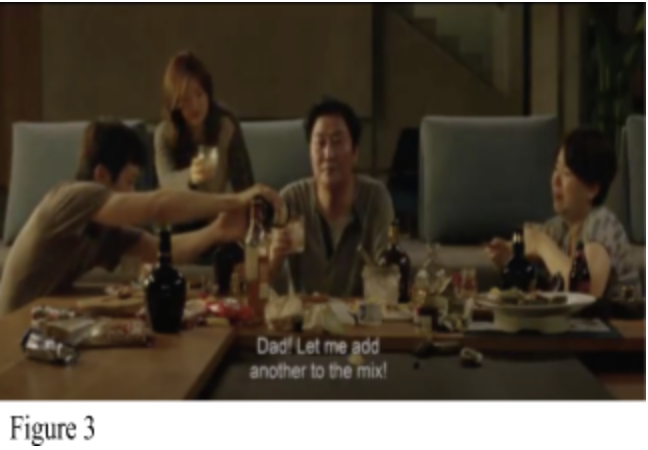
Despite their underprivileged lifestyle, manual workers cannot escape associating themselves with the members of the upper class; they rely on them for jobs. From the perspective of the other side, the upper class depends on the work of the lower class to preserve their income. Therefore, they must influence the conditions of the lower class to maintain their own social status. Erik Olin Wright outlined the dependencies of each class in Class Counts. Most notably, Wright references the “shmoo” from the Li’l Abner comic strips, a creature that transforms itself “into the material things human beings need” (Wright 48). In the context of class relationships, those of the lower class would look toward the shmoo to give them the basic items of which the capitalists deprive them, such as capital and honor. If the shmoo grants the workers what they please, then the incentive for them to work negatively affects the success of the capitalists. In Parasite, the Kims, seeking to break free from their penniless lifestyle, collectively participate in a scheme to work for the Parks to earn themselves money and societal prestige. However, as they become settled into the lifestyle of the Parks, they become less meticulous in their decision making. For instance, when the Parks left their estate to go camping, rather than respecting the Parks’ property as they were hired to do, the Kims indulged in the treats of the house, drowning themselves in the expensive snacks and liquors (56:29). Sprawled across the Park’s couch, the Kims were not hesitant in making a mess (see Figure 3). Now finding themselves in a situation in which their desires started to become satisfied, the Kims’ motivations to continue their work with the same quality declined. As a result, the status of the Parks that the Kims uphold becomes endangered.
Conversely, those of the upper class would look toward the shmoo for gaining material interests and investments for themselves. This is achieved by eliminating any threats that members of the lower class may pose toward the power of the upper class. Considering the great authority of the upper class and the number of potential workers in the lower class, the members of the upper class can easily overcome any possible issues by replacing workers. In Parasite, the Parks demonstrate this by firing their house servants because of the various dangers they could have presented against the family’s legacy. In one case, the Parks ousted their starting chauffeur after finding a pair of panties in the back seat of the car (31:48), signaling that he had engaged in inappropriate behavior sexual behavior while transferring the daughter of the Kim family home. If they were to keep him in place and a scandal were to break, Dong-Ik’s entrepreneurship could have been in jeopardy. Additionally, the Parks fired their housemaid after finding a tissue covered in what seemed like blood; they figured that she had tuberculosis (44:03). In both cases, the supposed conditions of the servants did not comply with the assurance that the Parks needed that they would maintain their superiority. As a result, the Parks sought to dispose of their workers. However, given that the lower class is so dependent on the upper class for employment, the Parks were able to immediately replace them with members of the Kim family.

With more respect in society than the manual workers, the non-manual workers hold a higher level of social honor in society than do manual workers. As a result, according to Weber, the upper class can wield their influence to establish the desired customs of society as being the objects that they already possess (Weber 64). Given that the lower class is deprived of such traditions, they become inherently disadvantaged (Weber 65). Even if the members of the lower class were to artificially present themselves as something that they are not, their imitations do no good when it comes to propping them higher up in society. As Weber puts it: “The submission to fashion also exists among some men in America…considered to be an indication of the fact that a given man pretends to qualify as a gentleman” (Weber 62). The symbol of smell in Parasite highlights the contrast in the level of social honor that the upper and lower classes hold. While Dong-Ik and Yeon-kye share an intimate moment, Dong-Ik uncomfortably mentions that he senses an odor that resembles that of “an old radish” or “when you boil a rag” (1:27:55). He then associates this smell with the odor that Kim Ki-taek, the father of the Kim family, releases in the car, labeling it “Mr. Kim’s smell” (1:27:36). The conversation then pivots to Ki-taek’s quality of work. While Dong-Ik appreciates Ki-taek’s efforts, the nauseating smell he gives off prevents him from earning full marks. Dong-Ik expresses this by saying, “I’ll give him credit…But that smell crosses the line” (1:28:54; see Figure 4). Therefore, the unflattering odor that Ki-taek emits leaks through his facade of him presenting himself as a professional setting and limits him from gaining full honor in the eyes of the influential Dong-Ik. In the context of class, no matter how well the manual worker tries to fit with the lifestyle of those whom he serves, there will always exist a difference in social honor that separates the two.
Translated into modern society, the underlying theoretical issues of Parasite explain the implications of the capitalistic society in which the film takes place: South Korea. The intense authority that the upper class attempts to maintain has led to growing income inequality and shrinking confidence among workers. Various studies by prominent institutions like Statistics Korea, the Financial Supervisory Office of South Korea, and the Bank of Korea have found that South Koreans at the top of the income distribution have 5.78 times larger incomes than those in the lowest bracket; this proportion places South Korea as the country with the worst income inequality following the United States and Lithuania (Kang). Even after President Moon Jae-in entered office in 2017 and passed massive economic reforms, the rate of income inequality has continued to accelerate. In particular, the minimum wage reforms under President Jae-in, according to Professor of Economics at Dongguk University Kim Nak-nyeon, “has led to the elimination of many jobs, damaging the lower tier of income earners” (Kang). This unstable job setting has threatened the motivations of young low-income earners specifically, a group upon which the country relies to occupy blue-collar jobs. According to a September 2019 study conducted by polling organization Global Research, only 23 percent of those in their twenties from lower-middle-class backgrounds and below said they were optimistic that their quality of life will improve (Balhorn). Given these conditions, it comes to no surprise that income inequality is worsening in South Korea and that efforts to move up the economic ladder seem more and more impossible.
To the casual eye, Bong Jong-ho’s Parasite details the underprivileged Kim family as they swimmingly situated themselves into the lives of the wealthy Park family to better their lifestyle through an increase in income. However, by recognizing the influential concepts of several sociologists, viewers can perceive Parasite as a criticism against the class differences and their societal consequences that a capitalistic society generates. Specifically, the concepts of the film complement the theories of Max Weber about how one’s class situation is dependant on the individual’s level of social honor and income in society. Essentially, the greater the social prestige and monetary wealth an individual has, the greater their influence in society is. Playing off the ideas of Weber, other sociologists like Arthur Rose elaborates on the distinct characteristics that each class owns, Erik Wright outlines the exploitative relationships that develop in a society resulting from the dependency each class grows for another, and Paul Fussell furthers the trend of social mobility based on one’s position in society. Given that the higher class owns significant authority in society, the efforts of the lower class are underappreciated, making it difficult for its members to gain recognition. Applying these social perspectives to Parasite, the struggle of the Kims to reach their desires becomes understood; the overwhelming social power of the Parks allows the Parks to impose certain practices to suppress the advancements of the Kims while preserving the status of their own. The fundamental social premises of Parasite are not exclusive to the tale of the film but are also applicable to the societal inequalities that prevail in modern capitalistic societies like South Korea where the film takes place. Rather than being a society that functions to provide equal opportunities for success for all people, a capitalistic society works to further cement the inequalities that exist between classes by allowing parasitic interclass relationships to infect all who participate.
Works Cited
Balhorn, Max, et al. “Parasite, a Window Into South Korean Neoliberalism.” Jacobin, www.jacobinmag.com/2019/11/parasite-a-window-into-south-korean-neoliberalism.
Fussell, Paul. Class: Style and Status in the USA. Arrow Books, 1984.
Kang, H. (2019, March 11). South Korea’s Income Gap is Worsening. Retrieved April/May, 2020, from koreabizwire.com/south-koreas-income-gap-is-worsening/133887.
Parasite. Directed by Bong Joon-ho, performances by Song Kang-ho, LEe Sun-kyun, Cho Yeo-jeong, Choi Woo-shik, and Park So-dam, CJ Entertainment, 2019.
Rose, Arnold M. “SOCIAL MOBILITY AND SOCIAL VALUES.” European Journal of Sociology / Archives Européennes De Sociologie / Europäisches Archiv Für Soziologie, vol. 5, no. 2, 1964, pp. 324–330. JSTOR, www.jstor.org/stable/23988158. Accessed 16 Apr. 2020.
Wright, Erik Olin. Class Counts. Cambridge Univ. Pr., 2000.















